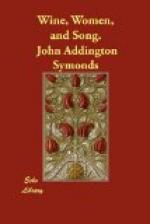I have now fulfilled the purpose which I had in view when I began this study of the Carmina Vagorum, and have reproduced in English verse what seemed to me the most characteristic specimens of that literature, in so far as it may be considered precursory of the Renaissance.
In spite of novelty, in spite of historical interest, in spite of a certain literary charm, it is not an edifying product of medieval art with which I have been dealing. When I look back upon my own work, and formulate the impression left upon my mind by familiarity with the songs I have translated, the doubt occurs whether some apology be not required for having dragged these forth from antiquarian obscurity.
The truth is that there is very little that is elevated in the lyrics of the Goliardi. They are almost wholly destitute of domestic piety, of patriotism, of virtuous impulse, of heroic resolve. The greatness of an epoch which throbbed with the enthusiasms of the Crusades, which gave birth to a Francis and a Dominic, which witnessed the manly resistance offered by the Lombard burghs to the Teutonic Emperor, the formation of Northern France into a solid monarchy, and the victorious struggle of the Papacy against the Empire, finds but rare expression in this poetry. From the Carmina Burana we cull one chant indeed on Saladin, one spirited lament for Richard Coeur de Lion; but their general tone is egotistic.
Even the satires, so remarkable for boldness, are directed against those ecclesiastical abuses which touched the interests of the clerkly classes—against simony, avarice, venality in the Roman Curia, against the ambition of prelates and the effort to make princely benefices hereditary, rather than against the real sins of the Church—her wilful solidification of popular superstitions for the purposes of self-aggrandisement, her cruel persecution of free thought, and her deflection from the spirit of her Founder.
With regard to women, abundant examples have been adduced to illustrate the sensual and unromantic spirit of these lettered lovers. A note of undisguised materialism sounds throughout the large majority of their erotic songs. Tenderness of feeling is rarely present. The passion is one-sided, recognised as ephemeral, without a vista on the sanctities of life in common with the beloved object. Notable exceptions to the general rule are the lyrics I have printed above on pp. 75-78. But it would have been easier to confirm the impression of licentiousness than to multiply specimens of delicate sentiment, had I chosen to ransack the whole stores of the Carmina Burana.




